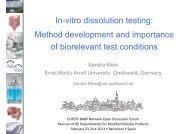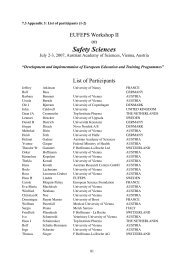2011 Anniversary Yearbook - EUFEPS today and history
2011 Anniversary Yearbook - EUFEPS today and history
2011 Anniversary Yearbook - EUFEPS today and history
You also want an ePaper? Increase the reach of your titles
YUMPU automatically turns print PDFs into web optimized ePapers that Google loves.
important steps towards a comprehensive<br />
implementation of “systems biology in<br />
pharmaceutical sciences”. This is at a time<br />
when the scientific community has just<br />
started to be fully aware of this paradigm<br />
shift in life sciences. Consequently, during<br />
the 2007 <strong>EUFEPS</strong> Basel Conference, a<br />
next step was taken as “biosimulation” <strong>and</strong><br />
“modelling” research were discussed in<br />
the light of systems biology. “Biomarkers”<br />
<strong>and</strong> “PAT science” describe other topics,<br />
which were brought up <strong>and</strong> h<strong>and</strong>led by<br />
<strong>EUFEPS</strong> as a pioneer. <strong>EUFEPS</strong> has<br />
proven, from the very beginning, that it<br />
has a good feeling where pharmaceutical<br />
sciences are going. It is competence, based<br />
on knowledge. Certainly, this feeling for<br />
future trends will enable <strong>EUFEPS</strong> to<br />
retain this leadership role in the future.<br />
What will be the major scientific<br />
challenges for <strong>EUFEPS</strong>, in the years to<br />
come, both within its traditional field<br />
of competence <strong>and</strong> beyond? Certainly,<br />
the translational science aspect will<br />
continue to play a significant role, because<br />
‘monodisciplinary’ <strong>and</strong> ‘silo’ thinking<br />
is perceived as a cause of the existing<br />
inefficiency in the drug discovery <strong>and</strong><br />
development process. Translational<br />
approaches in the pharmaceutical science<br />
– ‘translational pharmaceutical science’<br />
– are meant to make drug discovery<br />
<strong>and</strong> development more successful by<br />
stimulating direct interactions between<br />
the different tasks <strong>and</strong> disciplines<br />
forming the building blocks of the full<br />
process. Such science aims facilitate the<br />
translation of ideas, findings <strong>and</strong> concepts<br />
into products. Specifically, it addresses<br />
phases <strong>and</strong> steps in the drug discovery<br />
<strong>and</strong> development processes, such as<br />
the discovery-development transition<br />
or the preclinical-clinical transition.<br />
Clearly, emerging paradigms such as<br />
individualised medicines <strong>and</strong> therapies<br />
will specifically ask for translational<br />
approaches to ensure rapid introduction in<br />
the health care system.<br />
A further major task will certainly be<br />
to contribute to a harmonised integration<br />
of biotech pharma into pharmaceutical<br />
sciences. It is amazing to observe the<br />
general lack of the notion in the biotech<br />
field that a biotech product will have<br />
to be developed according to similar<br />
scientific <strong>and</strong> regulatory criteria as small<br />
molecules. On the biotech side, one can<br />
observe an insufficient knowledge of the<br />
rules <strong>and</strong> relevance of drug development,<br />
while many of the “conventional”<br />
pharmaceutical scientists forget that they<br />
must embrace new scientific fields – like<br />
molecular biology <strong>and</strong> genetics – to be<br />
able to claim full scientific competence in<br />
their own area.<br />
Concerning systems biology, it has<br />
not been too difficult for <strong>EUFEPS</strong> to<br />
generate awareness of the importance of<br />
systems approaches in a science that is<br />
intrinsically based on interference with<br />
biological systems. However, beyond this<br />
“general systems biology” awareness,<br />
LXVI<br />
“specific pharmaceutical systems<br />
biology” is a rapidly growing field of<br />
research, where genomic, proteomic <strong>and</strong><br />
metabolomic data are correlated by the<br />
use of biomathematics, bioinformatics <strong>and</strong><br />
other “in silico” methods. “Metabolomic<br />
networks based drug discovery” –<br />
together with “biosimulation” <strong>and</strong><br />
“rational drug design” – will significantly<br />
change approaches <strong>and</strong> efficiency in<br />
drug discovery. In fact, the “in silico”<br />
world has grown up over the years not<br />
only to complement almost every area of<br />
experimental pharmaceutical research,<br />
but also to provide us a tremendous wealth<br />
of scientific information via the Internet<br />
<strong>and</strong> other sources. Bearing this important<br />
development in mind, <strong>EUFEPS</strong> will<br />
strengthen its efforts to promote the use<br />
of the full scope of “in silico” methods<br />
<strong>and</strong> applications in pharmaceutical<br />
sciences both for experts <strong>and</strong> for those<br />
scientists for whom these methods will<br />
be complementary elements in their<br />
research.<br />
On the Mission to be Completed<br />
At this moment of change in Presidency,<br />
both the President <strong>and</strong> the Past President<br />
are convinced that <strong>EUFEPS</strong> is right on<br />
track to fulfil its mission. It has embarked<br />
on a spectrum of initiatives with active<br />
participation of colleagues from academia,<br />
industry <strong>and</strong> regulatory bodies to further<br />
shape the future of the pharmaceutical<br />
sciences in Europe.




